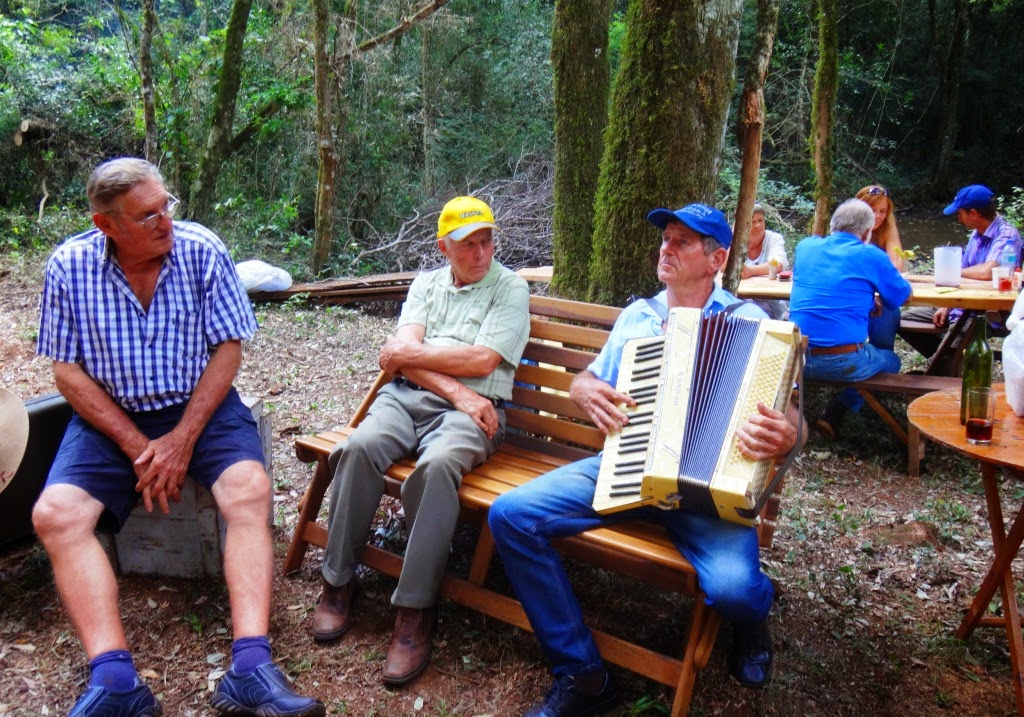Eine Frucht mit unterschiedlichen Namen.
Am meisten bekannt als „Jabutícaba“ oder „Yvapurû“.
Auch Guaperu, Guapuru und Hivapuru.
Als Posttitel, entschied mich für die aus dem
„Guaraní“ stammende Bezeichnung;
Yvapurû.
Für mich ist es eine heimisches Wort, denn die Indianersprache
Guaraní gilt in Paraguay als 2.
Hauptsprache
und von dem (einfachem) Volk überwiegend benutzt.
Seine Bedeutung;
Yva = Frucht
purû = krachen/knacken.
Während „Jabuticaba“ hier in Brasilien zur Bezeichnung der Frucht gilt.
Es stammt aus der Guaraní-Sprache „Tupí“ und bedeutet;
Jabutí = Schildkröte
caba = Platz/Ort
(Wo Schildkröten sind)
Ja mei, Unterricht war nicht meine Absicht!
Nur eine kleine Erklärung…
…und da wir jetzt so gut über den Namen Bescheid wissen,
kommen wir zum Kern Frucht!
A fruit with different names, but
mostly
known as "Jabuticaba" or "Yvapurû".
Sometime the names; Guaperu, Guapuru and Hivapuru, also appear.
For the post title, I decided to use the Guaraní version. It’s familiar to me,
Sometime the names; Guaperu, Guapuru and Hivapuru, also appear.
For the post title, I decided to use the Guaraní version. It’s familiar to me,
since
it is the native and second official language of Paraguay
Its meaning;
Its meaning;
Yva = fruit
purû = crashing noise / pop
While in Brazil the fruit is called "Jabuticaba
It comes from the Guaraní language "Tupi" and means;
Jabutí = turtle
caba = location / place
(Where turtles are)
purû = crashing noise / pop
While in Brazil the fruit is called "Jabuticaba
It comes from the Guaraní language "Tupi" and means;
Jabutí = turtle
caba = location / place
(Where turtles are)
Neulich, als wir bei Fernando waren, zeigte mir Manfredo
ein Yvapurû Bäumchen, dass dort wuchs und zu unserem Glück,
auch schon reife Früchte trug.
Ich haute rein, was das kleine Bäumchen hergab!
Im Englischen wird der Baum auch als „Traubenbaum“ bezeichnet.
Obwohl auch Likör und Wein daraus hergestellt wird, ist sie meiner
Meinung nach, 100x leckerer als die herkömmliche Weintraube.
Sehr aromatisch und gesund. Sehr süß und knackig. (Daher auch der Name)
Es ist eine sehr langsam wachsende Pflanze, somit auch als Bonsai
beliebt.
Das Lustige ist; nur der Stamm trägt Früchte.
The other day, when we were at Fernando’s, Manfredo
showed me
an
Yvapurû Plant, with some ripe fruit.
How lucky for us!
I haven’t had any for decades, so I ate
whatever was on the little tree!
In English, the tree is also called "grape tree".
In English, the tree is also called "grape tree".
But if you ask me, I prefer the Yvapurû 100
times over the traditional grapes.
They are very aromatic, sweet and healthy.
It is a very slow growing plant, but the funny thing about it;
the fruit only grow on the stems.They are very aromatic, sweet and healthy.
It is a very slow growing plant, but the funny thing about it;
Um euch von vornherein eine Endtäuschung zu ersparen;
Obstläden und Supermärkte in Europa werden die Frucht mit großer
Sicherheit, wegen ihrer Unhaltbarkeit, nicht führen.
Fernandos Bäumchen befindet sich noch im Jugendalter, deshalb habe ich
die nächsten vier Bilder aus dem Netz gefischt um euch zu zeigen, wie auch
größere Exemplare aussehen.
***
Fernando’s tree is still small, so I got a
few pictures out of the Internet,
for you to see (on the next four pics), what a grown
tree with fruit looks like.


Ich
wünsche euch einen schönen Sonntag
und sende ganz liebe Grüße!
I wish you a great Sunday
and send you regards!




























































